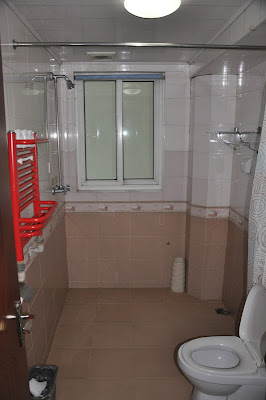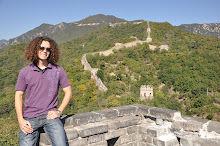At 8:30am, my cell phone rang. Wake up time wasn’t for
another 30 minutes, so I was a bit slow to answer and missed the call. The
number was unrecognizable. Irritated, I dismissed it as a wrong number. Rather
than try to force myself back to sleep, I headed to the kitchen to make breakfast.
Before I could even heat the omelet pan, I received a text from the same number
as the missed call.
It read, “Hi. This is Gu. Josh’s boss. Please call me if you
free. Thank you.”
The day before, through a random series of events that
involved a helpful taxi driver and a visit with a University Dean, I was united
with Josh, a fellow American who taught at a language center in town. We had a
quick, 10-minute chat and he
gave me the contact details for his boss, Mr. Gu. Before I went to bed that
evening, I sent a short email to Mr. Gu inquiring about teaching opportunities
at the language center.
As I was groggily recalling the who’s and what’s surrounding
this Mr. Gu that was texting me, my phone rang. It was Mr. Gu calling. Again. His
eagerness to contact me seemed like a positive sign for my prospect for
employment.
I answered with my standard Chinese and English greeting, “Weí.
Nǐ Hǎo. Hello. This is Matthew”.
“Hello. This is Gu. Josh’s boss at the English center.” He
spoke with a heavy accent, but slow enough that I could understand him.
“Yes, I talked to Josh last night. Hello Gu. How are you?” I
was expecting the formalities to continue with the usual, “Fine. And you?”
I was not prepared for what came next.
“Ok. Where are you now?” he demanded.
“I’m in my apartment”.
“Where is your apartment?”
“I’m at the Wànghǎilóu Apartment.”
“Ok. I be there in 5 minutes.”
Now, the typical Western reaction would have been to inquire
a bit further and to try to get a rational grasp on what the heck was going on.
Why are you coming here? Why are you coming here so soon? How are you coming
here? What do you look like?
However, this is China where “Just roll with it” is the mantra
that one must adopt to survive all the WTF? moments that one encounters as a daily
part of life in the Middle Kingdom. Such questioning would have led to more
confusion and frustration, not clarification. I did mention in my email that I
wanted to meet with him soon, so whatever was going on had to be a good sign.
Right?
I shrugged my shoulders and simply replied, “Ok.”
I hurriedly brushed my teeth, changed clothes, made myself
presentable, and waited for him in the lobby. A few minutes later a middle-aged
Chinese man entered, walked directly to me and asked if I was Matthew. I
confirmed. We shook hands.
“Ok. Let’s go,” he said, pointing outside.
I did as I was told and followed him outside. We made our
way to his car and drove off to some destination unknown to me. During the
drive, he asked me a few questions about my teaching experience and the length
of time for my stay in Penglai. He seemed disappointed when I informed him that
I would be leaving in 4 months.
Five minutes later, we turned into the entrance of a high
school and were waved through a manned gate. Mr. Gu parked the car and got out.
He didn’t provide any instruction to me so I just sat in the car wondering what
the heck was going on. He returned shortly with an older Chinese woman. She was
introduced to me as Ms. Feng, one of the English teachers at the center.
Ms. Feng spoke English fairly well and began asking me the
same types of questions that Mr. Gu had about my teaching experience and length
of stay in Penglai. In the meantime, he drove us to a nearby restaurant.
He parked the car and said, “Ok. Let’s go”. Dutifully, I
followed the two into the restaurant. We sat down at a table and Mr. Gu was
given a menu. He opened the menu to the coffee page and offered me one of the
options.
“I’m sorry I don’t drink coffee,” I said. Inwardly, I
immediately regretted declining his offer. I had probably disrespected him with
some kind of social offense.
Both Mr. Gu and Ms. Feng looked surprised. “Oh, I thought
all Americans drank coffee,” Mr. Gu said.
To save face, I said, “I prefer tea.” Though, I’m not much
of a tea drinker either.
They both relaxed and let out an audible “oh”. This seemed
to appease them.
We looked at the tea page of the menu. Mr. Gu offered green
tea or black tea. I pointed at the chrysanthemum tea. Mr. Gu ordered the tea
while Ms. Feng explained, “Usually only
the women drink this tea. But it’s good for the skin.”
Could I embarrass myself any more?
As we continued talking, it dawned on me that I was actually
being given a job interview. Ms. Feng was asking about my teaching experience
in Thailand and my experience with children. Meanwhile, Mr. Gu was emphasizing
that the school wanted to teach American English rather than British English.
“America is great,” he beamed. “China is great.” He linked
his hands together and proclaimed, “Together. China and America is very good.”
I couldn’t disagree with him.
The tea arrived in a beautiful glass teapot containing hot
water and chrysanthemum flowers inside. Mr. Gu poured the tea into our delicate,
decorated tea cups. As I tried to sip my lady tea in the manliest manner
possible, we discussed the issue of my short time in Penglai. Getting a work
visa would be impossible. As a compromise I offered to teach English, if they
agreed to provide me with a Mandarin course.
They both became very excited at this idea.
“We will do an exchange,” Ms. Feng confirmed. “You will have
English class and you will have Chinese class. Today you start Chinese class at
3 o’clock.”
Wow! That was soon. I didn’t have anything else to do, so I
told her that I would be there.
“Good. We go to school now.”
 |
| The front of the building of the School |
We got back in the car and drove to the language school in
the center of town. The school was on the second floor of a typical concrete
building. It contained a lobby and about 4 or 5 small classrooms, each able to
accommodate up to a dozen children. I was led into one of the classrooms where
a teacher’s assistant, a young Chinese woman by the name of Lucy, was preparing
a lesson on the computer. Ms. Feng showed me the textbooks they were using for
the children. She busied herself helping Lucy prepare the lesson and I stayed in
the room thumbing through textbooks and looking around.
Fifteen minutes later, Mr. Gu entered the room with his
iPad. He was using Skype and talking to somebody in English. He sat at the
table and excitedly motioned for Ms. Feng and me to join him.
Ms. Feng asked the person on the other end, “My voice is
good for you to hear?”
An American woman’s voice responded, “Yes, it’s a bit
choppy. I can hear you. But it’s coming in and out.”
Unable to translate the woman’s sentence because of the
slang, Ms. Feng and Mr. Gu had puzzled looks on their faces. I clarified, “The
woman has trouble to hear you.” They understood my translation and Mr. Gu
turned off the video. I looked at the screen and noticed the woman’s name was
Jamie.
After it was established that Jamie could hear better, Ms.
Feng fired off a question, “Do you like teaching children?”
So much for formal introductions.
As the questioning continued, I had a sense of déjà vu.
These were the same questions that I was asked over tea less than an hour
before. I was sitting in on an international phone call for Jamie’s job interview to teach English at
the language school in China! Too bizarre for my comfort, I really wanted to
excuse myself. But I didn’t want to disappoint Ms. Feng and Mr. Gu. So I just
“rolled with it” and stayed put.
It turned out that Jamie found out about the school through Josh
as well. They were certified through the same TESOL course in the States.
Sometimes Jamie used slang or
professional words that Ms. Feng didn’t understand. On several occasions, I
translated Jamie’s responses into simpler phrases to help keep things moving. Finally,
after a rather awkward discussion on salary and “requirements”, it seemed as if
the interview was over. But Mr. Gu looked at me, turned the iPad in my
direction, and enthusiastically motioned for me to talk to Jamie.
I really
didn’t know what to tell the poor girl. I could tell from her responses to Ms.
Feng’s questions that the interview was not even remotely close to what she had
probably expected and prepared for. I quickly introduced myself to her (neither
Mr. Gu nor Ms. Feng had ever introduced me!) and told her that today was my
first day. She seemed surprised to hear my voice but relieved to be talking to
a native English speaker. I asked about her travel experience outside of
America and if she was aware of the cultural differences in China. Basically, I
was asking her if she knew what she was getting herself into. She told me that
she had only been to Canada and South Africa, but that Josh had prepped her a
little about China. She was confident about her ability to adapt and be flexible.
I didn’t want to discourage her, so I held my tongue and gave her my email in
case she had any questions. And just
like that the interview ended as abrupt and unexpectedly as it had started.
After the interview, we got back into Mr. Gu’s car and dropped
off Ms. Feng at the primary school where we had picked her up. She reminded me
of my Chinese lesson at 3pm and said goodbye. Mr. Gu dropped me off at my
apartment where I was left wondering, What
the heck just happened?
It occurred to me that throughout the morning’s events I was
never informed about anything that was about to happen. From Mr. Gu picking me
up, to picking up Ms. Feng, to my job interview, and Jamie’s job interview, it
never occurred to them to give me advanced notice, heck any notice, that these things were going to happen. I just rolled
with it all not really knowing if anything was concretely accomplished. But I’m
pretty sure I have a new job! I think…
















